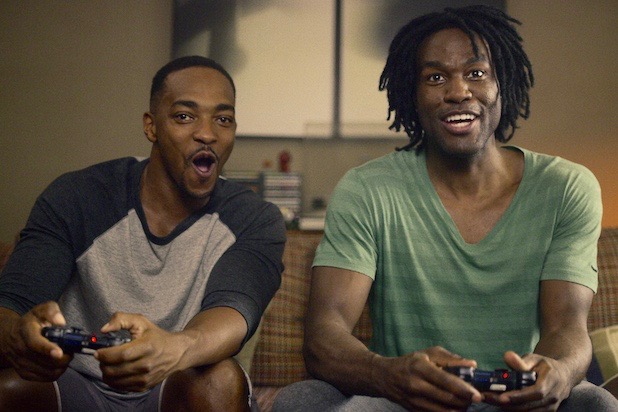Genre: Drama/Light Sci-Fi
Premise: Two life-long friends, one married, one single, find joy in playing their favorite fighting video game together, Striking Vipers. But when the latest version of the game becomes too realistic, the friends find themselves exploring it in unexpected ways.
About: Black Mirror is back, this time with only a 3-episode season, likely because they spent a big part of their budget on the Black Mirror feature, Bandersnatch. This episode has a strange development history to it. It was originally about a corporate VR exercise where team-members would enter a VR simulation to stage a musical – the key idea being that inside the simulation nobody knew who was who. It just goes to show that your original idea isn’t set in stone and that if another storyline starts to show promise, you should follow it.
Writer: Charlie Brooker
Details: 1 hour long
I still contend that Charlie Brooker has the best gig in the world. Even if you compare him to the titans of the industry – Steven Spielberg, James Cameron, JJ Abrams, the Russo Brothers – all of those guys have to fight like mad for three years to get movies through the slog of a system known as Hollywood, with a gaggle of corporate types breathing down their necks the whole time. I was watching a Russo Brothers interview after they finished filming Endgame and they looked like they were on the verge of passing out. They were mumbling incoherently, confused about what they could and could not say, and genuinely seemed over it.
Meanwhile, Charlie Brooker gets to write and make these experimental mini-movies, knowing that the second he finishes writing them, he can start shooting. Imagine a world where you come up with an idea, spend a couple of months writing it, then immediately afterwards, shoot it? That’s the world Charlie Booker exists in. And sure, the immediacy of that formula results in some misses. But because he’s so talented, it far more often results in hits. Which leads us to today’s script, a futuristic update of Brokeback Mountain.
For those who haven’t seen the brilliantly directed episode, it follows Danny, a married father of one who looks about as happy in his marriage as I do at the dentist. Technically, Danny is living the dream. His wife is gorgeous. He’s got a house with a killer view. His backyard parties look like the stuff of Hollywood commercials.
Meanwhile, Danny’s best friend of 15 years, Karl, chose the opposite path in life, enjoying being a single man, dating as many beautiful girls as possible, and killing it at work. The thing that has always bonded these two men together is the video game Striking Vipers, which is an unofficial stand-in for Street Fighter. During one of Danny’s parties, Karl gives him the latest version of Striking Vipers, a Matrix-like update where you literally become the character you’re fighting as.
In their first remote game (the two are each at their respective homes playing online) Danny chooses to play as his favorite character, the Bruce Lee-like “Lance,” and Karl chooses the buxom Asian blond, Roxette. But something funny happens during the fight. Roxette kisses Lance! Lance goes along with it, but it becomes too weird for Danny, who cancels out of the game. A few days later, Karl pops up online again, the two briefly chat, confirming to each other that the last game was a mistake, only to jump into the game, and this time have sex!
Danny finds himself looking for every opportunity to slip away from his family and play Striking Vipers with Karl, but eventually his wife senses that his focus is elsewhere, forcing Danny to decide what he’s gonna do about both relationships. He figures that he and Karl must meet in person and kiss to see if this is just a ‘game’ thing or a ‘real life’ thing. His whole life hangs in the balance of this kiss. What will happen?
First of all, I loved this episode. It’s one of the best Black Mirror episodes I’ve seen. Even better, it brings up an extremely important screenwriting talking point, something it’s imperative every screenwriter understand.
When you come to Scriptshadow, the formula you always hear about is GSU – Goal, Stakes, Urgency. The most important component of those three is definitely the first one – GOAL. Your main character having a goal will be the primary driving force of the story. The reason for this is simple. If your character is going after something, he’s going to bring the story with him.
However, not every story is goal driven. And this is particularly true in television, because in a season of 8, 10, and sometimes 22 episodes, it’s hard to always give your character a goal. So there’s something else that TV uses. And it’s called “The Dramatic Question,” which amounts to a question at the beginning of the episode that the audience will stick around for to get the answer to. In the case of Striking Vipers, the dramatic question is: “Will these two end up together?”
The problem with the Dramatic Question format is that it’s too loose. It’s easy for a writer to convince themselves that they’ve come up with a question that the audience finds worthy. For example, I’ve read lots of coming-of-age scripts over the years that have had no character goals and when I asked the writer why it was he thought the reader would want to read to the end, his answer was some version of, “They’re going to want to know what happens to my character.”
Let me make something clear: “Will my character’s life turn out okay?” is not a good enough dramatic question to build a story around. It’s too vague. And this is the problem with the Dramatic Question format. It provides too much leniency in its framework. Luckily, I have a way for you to fix that. When it comes to the Dramatic Question, there’s one change you need to make, and if you do it well, your Dramatic Question episode, or even movie, will work.
You change “Stakes,” to “STAKES.” In other words, in a Dramatic Question narrative, the stakes need to be sky-high. Look no further than Striking Vipers to see how this is done. The stakes are EXTREME. Danny has a wife, a home, a kid. If this relationship with Karl goes beyond the game, he could lose all of that.
I would go so far as to say if you’re more interested in television than you are in features, you have to master the Dramatic Question narrative. Cause a lot of times, the only thing to do in an episode will be character-driven (as opposed to plot driven). So you’ll want to lay down an important dramatic question at the beginning of the episode.
Also, Dramatic Question narratives are MUCH HARDER to do in features. They can be done, of course. But a big reason this episode works (in addition to other TV episodes) is that the answer to the question comes within an hour. Once you try stretching that into two hours, boredom sets in. The stakes need to be EVEN HIGHER. The character work needs to be EVEN BETTER. As much as I liked this episode of Striking Vipers, there’s no way it would’ve worked as a feature.
All you Dramatic Question Feature Junkies – you’ve been warned.
I’ve seen some reviews online saying this batch of Black Mirror episodes wasn’t that good. I’ve only seen the first two episodes but so far, they’re some of the best episodes in the series. Haters gonna hate! Scriptshadow gonna like.
[ ] What the hell did I just read?
[ ] wasn’t for me
[ ] worth the read
[x] impressive
[ ] genius
What I learned: High stakes are imperative when you don’t have a strong character goal or narrative urgency. Just to drive this point home, imagine this story if Danny is single, just like Karl. The entire episode collapses. Sure, you still have two guys struggling with their sexuality. But that struggle isn’t disrupting anything. Giving Danny so much to lose is what makes the answer to this dramatic question – Will these two end up together? – so compelling.
What I learned 2: The more general and unfocused the dramatic question in your Dramatic Question narrative is, the less interesting your story will be. For example, the most generic of generic questions is, “What’s going to happen?” Yet there are bad writers everywhere who think that as long as there’s some semblance of this question driving their narrative, readers will be captivated. It takes more than that. Focus in on exactly what your question is, keep the stakes high, and your Dramatic Question episode or feature should be in good shape.



